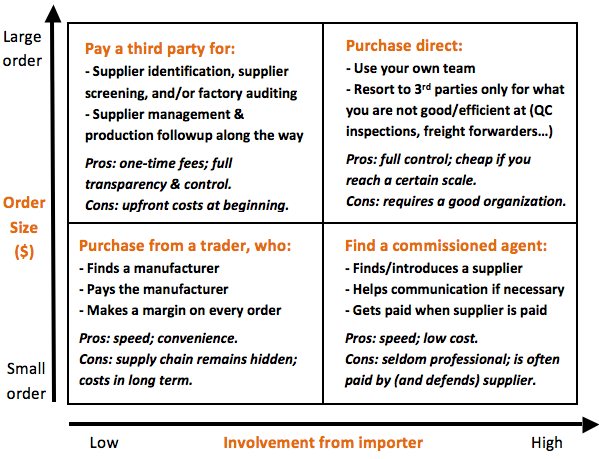 When an importer wants to source a new product in China, he basically has 4 options, 3 of which involve the use of a sourcing company:
When an importer wants to source a new product in China, he basically has 4 options, 3 of which involve the use of a sourcing company:
Of course, you can find a supplier on a trade show or in an online directory (e.g. Global Sources), ensure they are serious via a background check and a technical audit, and start purchasing directly.
If you have the right organization to support this model and if you find suppliers easily, you don’t need a sourcing agent.
In other cases, you need to make a choice between three types of sourcing agents:
The commissioned agent
If you find someone that you can trust, and who already has deep experience in the product line you are looking for, this can be a good option. You pay this agent a fixed proportion (usually between 5% and 10%) of the FOB price for the orders that he follows.
The problem is, importers are seldom good at judging whether someone is trustworthy. I bet 95% of commissioned agents get money from the factory without telling the buyer. When things go wrong, many of them actually defend the factories in front of their clients! This is why I generally don’t advise to use this type of agent.
I classified it as “high involvement” because the purchaser needs to follow what happens closely. These agents are seldom professional enough to really manage production and to ensure good outcomes. Once the orders reach a certain size, it is much better to manage everything with your own team.
Related articles:
- Sourcing agents in china: the good and the ugly
- Hidden commissions between China factories and sourcing agents
The trading company
If you purchase low quantities and if you don’t want to handle all the details of China production, you probably need to work with a trading company. They can find small factories (often unable of dealing directly with export customers) that are interested in your small orders.
The trader adds its margin on top of the manufacturer’s price. That’s why many professional purchasers want to “go direct”. This is not rational because, if you negotiate prices, a trader might still be cheaper than a larger factory (which tends to be more expensive than small workshops, in China anyway).
What bothers some importers is that the supply chain remains hidden. This is a valid concern. Even if you purchase from a trader, you should inspect the product quality — except if the trader pays for a famous third-party QC firm to do it, and shows you the reports.
Related articles:
- Advantages of buying from a trader in China
- Chinese trading companies and their dirty little secrets
The third party service provider
As the saying goes, you can eliminate the middleman, but you’ll have to take over the functions he performs… Or subcontract them to a third party!
If you place large orders, many manufacturers will take the time to respond to a third-party service company’s inquiries. And the service fees will likely be low, compared to the total order size. This is why this option is best suited for large orders.
If you can justify the upfront investment, this is a great way to source new products. You’ll benefit from a professional identification & screening process, and you will have full information over your supply chain.
Some of these companies sell their services as “project management”, “procurement”, or “supply chain management”. They often adapt their pricing structure to each customer. Some of them act as a trader and take possession of the goods. Not all of them are 100% transparent about every sub-supplier. I admit this is a wide category…
Related article:
Top 10 mistakes to avoid when outsourcing your sourcing
What do you think?
>> Related eBook: Understanding How to Reduce Quality Issues & Costs in a Factory


I agree with your post but I also think that not only large orders justify third party service provider or a direct purchase but also when the product is critical, I mean strategic material , custom design, etc
Jose Luis Val,
You are right. There are many exceptions to my classification. Every classification is a simplification, if we want it to remain readable.
Great write up Renaud and generally good summary of the sourcing options available to importers. I think that there could maybe also be a 4th type of sourcing agent option added, which is essentially having a representative sourcing office (as opposed to contracting an agent). This is an option that combines many of the characteristics from the other options by offering full-service solutions which is generally more professional than the commissioned agent and more comprehensive than the 3rd party described. Some points are that pricing schemes are more flexible given the type of order (though often do work on either a retainer fee or commission) and it is generally more efficient if you have larger orders though still potentially feasible otherwise depending on the situation (as noted by Jose above). Wonder what your thoughts are on this option?
Buck,
As you write, it is an hybrid of the 3 options I described above: sometimes paid by commissions, sometimes for a fixed amount, sometimes (for some of them) buys and resales the goods.
Generally it allows the importer to be less involved in following production, so it should be in the left quadrants — I would see it together with the “3rd party sourcing agent”.
I am going to update the article and write something about this. Thanks for mentioning it.
No problem. Definitely agree it is a wide category. It is a pretty busy category as well as there are a lot of companies that adapt and differentiate themselves while possibly still falling under that category.
It is true. My experience is that Chinese supply as per country specific and own inspection and checking is very imporatant in any case because it is most possible that you will not get exact material. We find this is happening with Indain importers. This is appliable in Machinery and Industrial goods. Moreover they donot supply any spare parts list and prices ,therefore getting spares becomes difficult mostly.Safety is also aconcern with mosty of the prodcuts.
If i’m an import agent could I go to a third party for large orders? sort of defeats the purpose of been an agent , but could it work?
Tom,
Not necessarily. If you purchase from a small factory (that can’t deal direct with export customers) through a trading company (that only takes a few %), it can make sense.
thanks
i think commissioned agent is better than trading company, because only commissioned agent is taking percentage from factory, and when you work with trading company, the company+sourcing guy in the company are taking percentage.
Hahaha that’s a funny comment. Yes, sometimes the purchaser or a manager in the trading company also takes a commission in his pocket from the factory.
There is a new choice:
Open a China office expenses are very high; through intermediaries would incur additional costs, and cannot within your control. Is there a way has the best of both worlds? The answer is Yes. That is business representative you are looking for. Business representatives have this three notable features:
1.Represent your interests. Business representatives are standing for you, to consider your point of view and work at any time. Your business representatives in China, equivalent of your China office, then you have staff in China to handle orders, samples, and many other issues. Savings all kinds of costs like operations, management, labor costs, and so on, which required when you have real office in China.
2.Transparent business and transaction. Due to business representatives are entirely represent your interests, so no need to worry they charge extra commission or other under the table deals may cause by possible integrity problem, which affect the cost of your purchase. Price, terms and payments are direct communication and exchanges between buyers and factory, which are completely transparent and open, there is no any interference from other party. Your business representatives just for you to communicate requirements, monitor progress, and report at the firsthand. This is the biggest difference between brokering, no middleman you can get things done well, to ensure the efficiency and convenience of the premise, minimize purchase and import costs.
3.Professional service. Business representatives usually specialized in kind of field, let them do the communication and follow-up orders is more professional than recruit staff through normal channel. Experienced business representatives can bring reasonable suggestions for you, they know how scientific process work, how to maximize cost savings, also effective propose solutions to the problems. With a wealth of industry knowledge and experience can act as your Chinese purchase consultant, what equally important is, high-quality professional services to bring you peace of mind, convenience, thoughtful experience are amounts of companies and buyers are after.
From above brief introduction, you can see that purchase in China, due to differences in culture and language, it is necessary to open office in China, but you do not really need a real estate office. You don’t have to go through brokers or trading companies, you can freely trading directly with factory. Just get an excellent professional business representative to help, maximum your outputs from the inputs. Separate from middlemen, let professional people do their work, this is not only a new choice for importers, and it is also an inevitable trend of economic development now happening.
Thanks Mike for sharing your experience. What you call “business representative” is very close to what I call “third party service provider”.
The third-party service provider you mentioned actually is essentially different to the business representative I mentioned although they are quite close.
The most fundamental difference is: business representative is to represent the interests of customers, business service provider on behalf of customers must sign a cooperation agreement with the purchaser (buyer authorize to business representatives service provider), so that business representative provider dealing with suppliers and related services all in the name of buyers, among suppliers, capital flow, order details, inspection, follow up on all the activities completely transparent to the buyer client, which the equivalent of the employees of the buyer.
So the services provided by a third-party service and a business representative are have significant difference.
[Edited by moderator — no promotion please.]
I don’t think so. From my observations, many third-party sourcing agents offer an “act as your China sourcing office” package.
Of course here is not easy to analyze the distinction between you and me ideas in short text.
Anyway, I still believe there is core difference between third parties services and business representative services. As far as I know like the “Third Party Services” or “third party sourcing agent office”, they don’t have sign the authorized contract with the buyer, therefore from the legal level, business representative services that I mentioned to solve the core issues on behalf of the interests of buyers (maximize avoid bribery, kickbacks from suppliers etc.). But you mentioned “third party sourcing agent office” did not solve the problem from a legal perspective.
[Edited by moderator — no promotion please.]